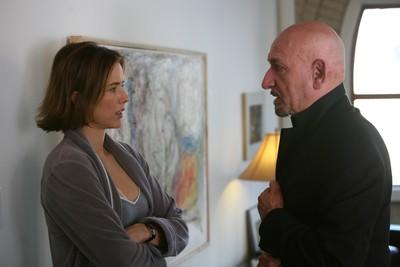“You Kill Me”

It’s not quite a killer comedy. Or a killer thriller, for that matter.
But "You Kill Me" definitely ranks as off-kilter.
A black comedy about a hit man so boozed-up he can’t shoot straight — because he’s sleeping on the job — "You Kill Me" doesn’t always live up to its gallows-humor potential.
Because stars Ben Kingsley and Téa Leoni do, however, it realizes enough potential to rank as a measured pleasure.
Returning to Las Vegas following its local debut as the closing-night attraction at last month’s CineVegas film festival, "You Kill Me" also marks a welcome return to the darkly comic, neo-noir world of director John Dahl.
Dahl made his feature debut in 1989 with the made-in-Nevada "Kill Me Again," delivering on its promise with such slyly twisty treats as 1994’s "The Last Seduction."
Since that peak, Dahl’s been wandering in the desert, cinematically speaking, ricocheting from the poker drama "Rounders" to the World War II adventure "The Last Raid," with a brief detour (back to Nevada) for 2001’s "Joy Ride."
At least "You Kill Me" demonstrates that he’s finally back on track.
That’s more than we can say for screw-up Buffalo hit man Frank Falenczyk (Kingsley), who works for the Polish mob in bleak Buffalo, N.Y.
When an arrogant Irish mobster named O’Leary (a typecast, but perfectly so, Dennis Farina) starts muscling in on the family’s operation, especially their pivotal snowplow business, Frank’s courtly boss, Uncle Roman (a dignified Philip Baker Hall), orders Frank to take care of the problem.
Alas, Frank’s the kind of guy so devoted to his vodka that he takes the bottle with him when he goes outside to shovel the snow off his steps — and tosses it into the snow between swigs to ice it down.
Little wonder, then, that Frank, on assignment to rub out O’Leary, dozes off in the front seat of his car instead.
Some folks would bump off Frank instead. But he’s family, so Uncle Roman instead dispatches him to San Francisco to sober up — or else.
Upon arrival, Frank’s fixer — a real estate broker (Bill Pullman) so ruthless he’d make a good mobster if he weren’t so busy making cutthroat property deals — sets him up in an apartment and finds him a part-time job. At a funeral home.
Frank’s so used to killing people, he has absolutely no problem dealing with the already dead — a talent that both surprises and gratifies the wryly mordant mortician (Alison Sealy-Smith) on duty.
Frank also joins Alcoholics Anonymous (or else), where he befriends a fellow member (Luke Wilson) who works in a Golden Gate Bridge tollbooth. Of course he’s gay, this being San Francisco.
Frank’s not, which makes him an ideal romantic partner for Laurel (Téa Leoni), who sells TV ad time and is as good at her job as Frank used to be at his.
She’s also flaky enough to find Frank’s status as an alcoholic — not to mention an assassin — no impediment whatsoever to romance. Hey, at least he’s not gay.
In real life, this relationship would make absolutely no sense.
In reel life — especially as lived in director Dahl’s skewed neo-noir universe — she’s just another colorful cog in the free-wheeling machinery of the plot.
Screenwriters Christopher Markus and Stephen McFeely (who’ve moved on to the "Chronicles of Narnia" franchise) don’t always shift smoothly between "You Kill Me’s" dual plotlines, jumping between Frank’s new life in San Francisco and his old one in Buffalo with all the subtlety of a toddler running riot in an inflatable bounce-house.
In addition, the script traffics in more than a few tiresome stereotypes, especially when focusing on Frank’s Polish mob family — who act a lot like the usual ethnic suspects, except that they chow down on pierogies instead of cannolis.
But the sure-footed Dahl maneuvers his way around such potential narrative roadblocks with an acrobat’s dexterity, balancing on the knife-edge between dark comedy and darker melodrama.
Kingsley and Leoni follow him onto the high-wire — and show off virtuoso moves with throwaway grace.
Leoni invests Laurel with such deadpan logic and screwball energy that every contradictory impulse her character exhibits (and she exhibits a lot of them) fits seamlessly into Laurel’s jumbled, jigsaw-puzzle personality. (It’s enough to make you wonder, yet again, why the smart, wisecracking Leoni has never gotten the big-screen comedy roles she deserves — or maybe it’s because so few people write comedy roles like that anymore.)
Kingsley, meanwhile, adds another finely etched portrait to his gallery of memorable mobsters, a gallery that ranges from "Bugsy’s" cagey Meyer Lansky to "Sexy Beast’s" force-of-nature fiend, Don Logan.
As always, however, Kingsley finds new notes to play. In "You Kill Me," it’s the intriguing mix of menace and melancholy, as Kingsley deftly contrasts Frank’s meticulous approach to, and pride in, the business of death with his abject terror of embracing life instead.
Because "You Kill Me" is a comedy, Frank eventually does embrace life — and love. But it’s a measure of how dark the comedy truly is that you’re never quite sure which way the bullets ultimately will bounce.